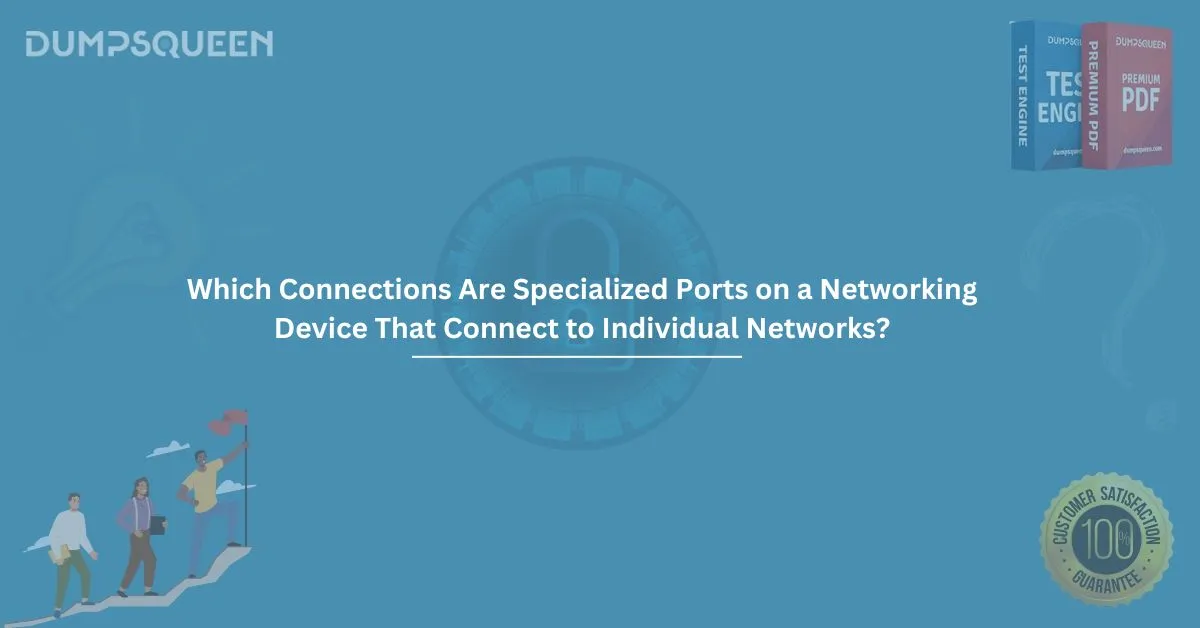In the complex world of computer networks, understanding how devices connect and communicate is foundational. One of the most frequently asked questions, especially in IT certifications like CompTIA Network+, Cisco CCNA, and Microsoft exams, is: which connections are specialized ports on a networking device that connect to individual networks?
This question is not only theoretical but also crucial for anyone working with routers, switches, or firewalls in real-world networking environments. In this detailed article by DumpsQueen Official, we’ll explore the concept in-depth, break it down with examples, and help you understand its importance in both exams and professional setups.
Understanding Specialized Ports in Networking Devices
To begin, it’s essential to understand the different types of connections and ports used in networking devices. Devices such as routers, firewalls, and layer 3 switches operate on multiple networks and need a mechanism to connect to each of them. These mechanisms come in the form of specialized ports.
The specialized ports referred to in the question are typically interfaces on a networking device—most commonly found on routers—that are designed to connect to individual networks. Each of these connections serves as a gateway for a specific subnet or network segment.
The Correct Answer: Which Connections Are Specialized Ports on a Networking Device That Connect to Individual Networks?
The correct answer is: Interfaces.
Interfaces are hardware ports on a router or similar networking device that are specifically configured to connect to different networks. Each interface is usually assigned its own IP address and network ID, acting as a unique point of communication between the device and a given network.
Why Interfaces Are Important
Let’s dive deeper into why interfaces are the specialized connections in question.
1. Segmentation of Networks
Routers use interfaces to manage and separate traffic between different networks. For example, in an office environment, one interface might connect to the internal LAN, another to a guest network, and a third to the internet. Each interface allows the router to direct traffic appropriately based on routing rules.
2. IP Address Allocation
Each interface has its own unique IP address within its assigned network. This is critical for routing protocols, security policies, and communication between devices.
3. Firewall and Access Control
Interfaces can be configured with firewall rules, Quality of Service (QoS) policies, and VLAN configurations. This level of customization ensures secure and efficient traffic management.
4. Protocol Management
Many routing protocols like OSPF (Open Shortest Path First) and EIGRP (Enhanced Interior Gateway Routing Protocol) are configured on a per-interface basis. Without interfaces, routers wouldn’t be able to participate in such protocols or properly forward packets.
Common Types of Interfaces
Understanding the types of interfaces available helps reinforce why they’re considered specialized ports:
- Ethernet Interfaces (FastEthernet/GigabitEthernet): Most common physical connections in small and large networks.
- Serial Interfaces: Used in WAN connections and leased lines.
- Virtual Interfaces (Loopback, VLAN Interfaces): Not tied to physical ports but used for logical configuration and testing.
- Wireless Interfaces: Found on wireless routers and access points.
Interface Configuration Example (Cisco Router)
Router> enableRouter# configure terminalRouter(config)# interface gigabitEthernet 0/0Router(config-if)# ip address 192.168.10.1 255.255.255.0Router(config-if)# no shutdownIn the example above, the gigabitEthernet 0/0 interface is configured with an IP address and activated to connect to the 192.168.10.0 network.
Exam Relevance – Why You Should Know This for IT Certifications
If you're studying for certifications like:
- CompTIA Network+
- Cisco CCNA
- Microsoft AZ-700
- Juniper JNCIA
…then understanding interfaces is non-negotiable.
Expect questions like:
- "Which of the following are specialized ports used to connect to different networks?"
- "Which layer of the OSI model is most closely related to the function of interfaces?"
- "How many interfaces does a router need to connect to three networks?"
This topic is foundational and often appears in multiple-choice and simulation-based questions.
Real-World Application of Interfaces
In the field, understanding and configuring interfaces correctly can mean the difference between a secure, efficient network and a non-functional one.
1. Enterprise Networks
Large organizations use core routers with multiple interfaces to connect to each department's network.
2. ISPs (Internet Service Providers)
Service providers use interfaces to segregate customer traffic, applying access control and bandwidth limitations per interface.
3. Home Networks
Even your home router has at least two interfaces: one for your local network (LAN) and another for your Internet Service Provider (WAN).
Common Misunderstandings About Interfaces
Let’s clear up some confusion often seen among new learners:
Myth 1: “Interfaces only exist on routers.”
False. Interfaces are present on switches, firewalls, and even virtual machines.
Myth 2: “One router interface can serve multiple networks.”
Not exactly. A router typically uses one interface per network, unless configured with sub-interfaces using technologies like VLAN tagging.
Myth 3: “Interfaces don’t affect security.”
Very false. Interfaces play a huge role in security, especially when used with firewalls, DMZs, and access control lists.
Troubleshooting Interface Issues
When dealing with real-world issues, knowing how to troubleshoot interfaces can save hours of downtime.
Tools to Use:
- ping and traceroute: To test connectivity across interfaces.
- show ip interface brief: To check status and IP assignment in Cisco devices.
- ifconfig/ip a: On Linux systems, used to view and manage interfaces.
Common Problems:
- Interface is shut down (
administratively down) - No IP address configured
- Mismatched speed/duplex settings
- Physical cable or port failure
Summary: Why This Question Matters
To wrap things up: the question "which connections are specialized ports on a networking device that connect to individual networks?" is essential because:
- It builds a foundation for routing and switching concepts.
- It directly relates to IP addressing and traffic management.
- It's relevant to almost every IT networking certification.
- It reflects real-world scenarios you'll encounter on the job.
By mastering the concept of interfaces, you not only pass exams like Cisco CCNA, Network+, and Microsoft AZ-700—you also become more effective in designing and managing scalable and secure networks.
Final Thoughts from DumpsQueen Official
At DumpsQueen, we prioritize helping students and IT professionals understand core concepts that appear frequently on certification exams. The question “which connections are specialized ports on a networking device that connect to individual networks?” is a recurring topic that bridges both theoretical and practical knowledge.
If you're preparing for your next IT exam, browse our latest dumps, practice exams, and detailed guides—all tailored to get you certified faster and smarter.
Sample Questions for Practice
Here are some sample multiple-choice questions (MCQs) to test your knowledge.
Question 1:
Which connections are specialized ports on a networking device that connect to individual networks?
A) USB Ports
B) Interfaces
C) Switch Modules
D) Access Points
Answer: B) Interfaces
Question 2:
In a router, which type of connection is assigned an IP address to route packets to different subnets?
A) Access Point
B) USB Port
C) Interface
D) Console Port
Answer: C) Interface
Question 3:
Which of the following best describes an interface on a networking device?
A) A wireless antenna used to transmit signals
B) A logical or physical port connecting a router to a specific network
C) A memory chip used for routing tables
D) A web-based configuration tool
Answer: B) A logical or physical port connecting a router to a specific network




